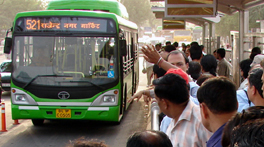Urban India’s parking woes: an overview
Vehicular congestion and insufficient parking facilities are significant emerging challenges for India’s mega and metropolitan cities, severely impairing mobility. Although curtailed by constitutional
Vehicular congestion and insufficient parking facilities are significant emerging challenges for India’s mega and metropolitan cities, severely impairing mobility. Although curtailed by constitutional
Pak Invitation For University Ahmedabad: Who do civic authorities in Pakistan’s second largest city — Lahore — turn to when they want to improve their bus service? They have requested experts from
Days after the National Highways Authority of India (NHAI) dragged the Ministry of Environment and Forests (MoEF) to the apex court alleging delays in granting of forest clearance, the ministry has granted forest clearance to the 555-km Kishangarh-Udaipur-Ahmedabad National Highway widening project that had first sparked the conflict. While the Forest Advisory Committee (FAC) has recommended the project, it is not amused with NHAI's rather public finger pointing at MoEF. Minutes of the FAC meeting held on January 21-22 observe how MoEF has been "blamed unpleasantly" for delays.
Taller Buildings To Be Encouraged Over Wide Area Ahmedabad: Raising the floor space index (FSI) by up to 30% across Ahmedabad to create more affordable housing units will be the thrust of the new development plan (DP) likely to be announced on Friday. The plan, which covers 1,772 sq km covering 68 villages, is expected to raise the FSI from the existing 1.2 in R-2 zones — construction of 1,200 sq yards on a plot of 1,000 sq yards — to 1.8, thus paving way for vertical growth on outskirts.
Utilisation of Municipal Solid Waste is important to curb the ever rising demand of scarce land for its disposal. Changing life style patterns, particularly in urban areas, has led to increase in generation
CEPT Profs For Upgradation Without Uprooting People Ahmedabad: As the proportion of world population living in urban areas has surpassed rural population, cities are facing major challenges in maintaining and restoring the environmental ecology that includes its water bodies. A paper titled ‘Sustainable development of urban water bodies using ESPA approach: A case from Ahmedabad, India’ by professor Neeru Bansal and professor Madhu Bharti of CEPT University’s Faculty of Planning and Public Policy was published in the International Journal of Humanities and Social Sciences in November 2012. The paper elucidates collaborative learning and how to do sustainable development of urban water bodies involving local residents.
The Planning Commission has suggested that the Railways should begin its high-speed rail (HSR) corridor project with the Delhi-Agra section rather than insisting on the Mumbai-Ahmedabad corridor. In a recent note to a steering group, the Commission has asked the Railways to take up the Delhi-Agra section of the 991 km-long Delhi-Agra-Lucknow-Varanasi corridor, as it would be able to execute the project on a stretch that is barely 200 km as a demonstrative exercise and before developing other corridors.
NHAI likely to take ministry to SC today for ‘failing to comply with delinking order’ The tussle between the environment ministry and the National Highways Authority of India (NHAI) over who caused the alleged delays in approvals in highway projects came to a head on Tuesday with the NHAI threatening to take the ministry to the Supreme Court on Wednesday, accusing it of failure to comply with an earlier court directive to de-link forest and environmental clearances.
Spanning 555 km, the project was to cost Rs 7,500 cr GMR Infrastructure has terminated the concession agreement on its Rs 7,500 crore, 555-km highway project connecting Rajasthan and Gujarat, India’s largest. GMR Infrastructure reached the decision after weeks of discussions with the National Highway Authority of India (NHAI), over getting various statutory clearances for the project.

<p><span id="itro1">This new book by World Bank explores the complex process of transit and land-use integration in the growing cities in developing countries including India. Focuses on identifying barriers
AHMEDABAD: Organized retail provides some hope to see farmers get their share of benefits but the post-harvest issues in horticulture commodities could only solve with joint participation from private and public sector, says a study by the Indian Institute of Management, Ahmedabad (IIM-A). The working paper 'Organized Retailing of Horticultural Commodities' by Piyush Kumar Sinha, professor at IIM-A and Sujo Thomas, academic associate at IIM-A discusses the changes in horticulture retail, which is mostly referred as the selling of fresh fruits and vegetables.